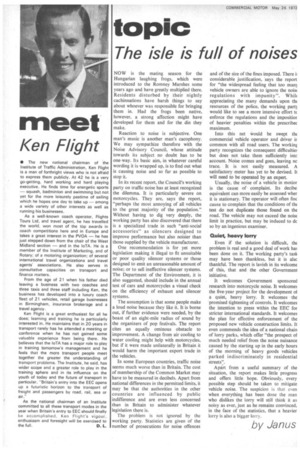topic
Page 48

If you've noticed an error in this article please click here to report it so we can fix it.
The isle is full of noises
NOW is the mating season for the Hungarian laughing frogs, which were introduced to the Romney Marshes some years ago and have greatly multiplied there. Residents disturbed by their nightly cachinnations have harsh things to say about whoever was responsible for bringing them in. Had the frogs been native, however, a strong affection might have developed for them and for the din they make.
Reaction to noise is subjective. One man's music is another man's cacophony. We may sympathize therefore with the Noise Advisory Council, whose attitude towards its subject no doubt has to be one-way. Its basic aim, in whatever careful wording it is wrapped up, is to find out what is causing noise and so far as possible to stop it.
In its recent report. the Council's working party on traffic noise has at least recognized the dilemma. It is particularly severe on motorcycles. They are, says the report, "perhaps the most annoying of all vehicles to the great majority of the population." Without having to dig very deeply, the working party has also discovered that there is a specialized trade in such "anti-social accessories" as silencers designed to improve performance but also noisier than those supplied by the vehicle manufacturer.
One recommendation is for yet more legislation making it illegal to fit unsuitable or poor quality silencer systems or those designed to emit an unreasonable amount of noise; or to sell ineffective silencer systems. The Department of the Environment, it is also suggested, should include in the annual test of cars and motorcycles a visual check on the efficiency of exhaust and silencer systems.
The assumption is that some people make a loud noise because they like it. It is borne out, if further evidence were needed, by the boast of an eight-mile radius of sound by the organizers of pop festivals. The report cites an equally ominous obstacle to improvement. A change from air cooling to water cooling might help with motorcycles, but if it were made unilaterally in Britain it would harm the important export trade in the vehicles.
In some European countries, traffic noise seems much worse than in Britain. The cost of membership of the Common Market may have to be measured in decibels. Apart from national differences in the permitted limits, it may be that the authorities in the other countries are influenced by public indifference and are even less concerned than in Britain to administer whatever legislation there is.
The problem is not ignored by the working party. Statistics are given of the number of prosecutions for noise offences and of the size of the fines imposed. There if considerable justification, 'says the report for "the widespread feeling that too mans vehicle owners are able to ignore the noisi regulations with impunity". While appreciating the many demands upon the resources of the police, the working part) would like to see a more intensive effort tc enforce the regulations and the impositior of heavier penalties within the prescribec maximum.
Into this net Would be swept the commercial vehicle operator and driver ir common with all road users. The working party recognizes the consequent difficultie but does not take them sufficiently intc account. Noise comes and goes, leaving nc trace. It is not easily measured. A satisfactory meter has yet to be devised. It will need to be operated by an expert.
Usually, the noise of a vehicle in motior is the cause of complaint. Its decibe equivalent can more easily be assessed wher it is stationary. The operator will often finc cause to complain that the conditions of the test do not duplicate those found on the road. The vehicle may not exceed the noise limit in practice, but may be induced to dc so by an ingenious examiner.
Quiet, heavy lorry Even if the solution is difficult, the problem is real and a good deal of work has been done on it. The working party's task may have been thankless, but it is alsc thankful. The report is lavish in its welcome of this, that and the other Government initiative.
It welcomes Government sponsored research into motorcycle noise. It welcomes the five-year project for the development of a quiet, heavy lorry. It welcomes the promised tightening of controls. It welcomes the intention to press within the EEC for stricter international standards. It welcomes the plan for effective enforcement of the proposed new vehicle construction limits. It even commends the idea of a national chain of lorry parks, which offer "the prospect of much needed relief from the noise nuisance caused by the starting up in the early hours of the morning of heavy goods vehicles parked indiscriminately in residential streets".
Apart from a useful summary of the situation, the report makes little progress and offers little hope. Obviously, every possible step should be taken to mitigate vehicle noise. The suspicion is that even when everything has been done the man who dislikes the lorry will still think it as noisy as ever, just as he remains convinced, in the face of the statistics, that a heavier lorry is also a bigger lorry.
by Janus




































































































